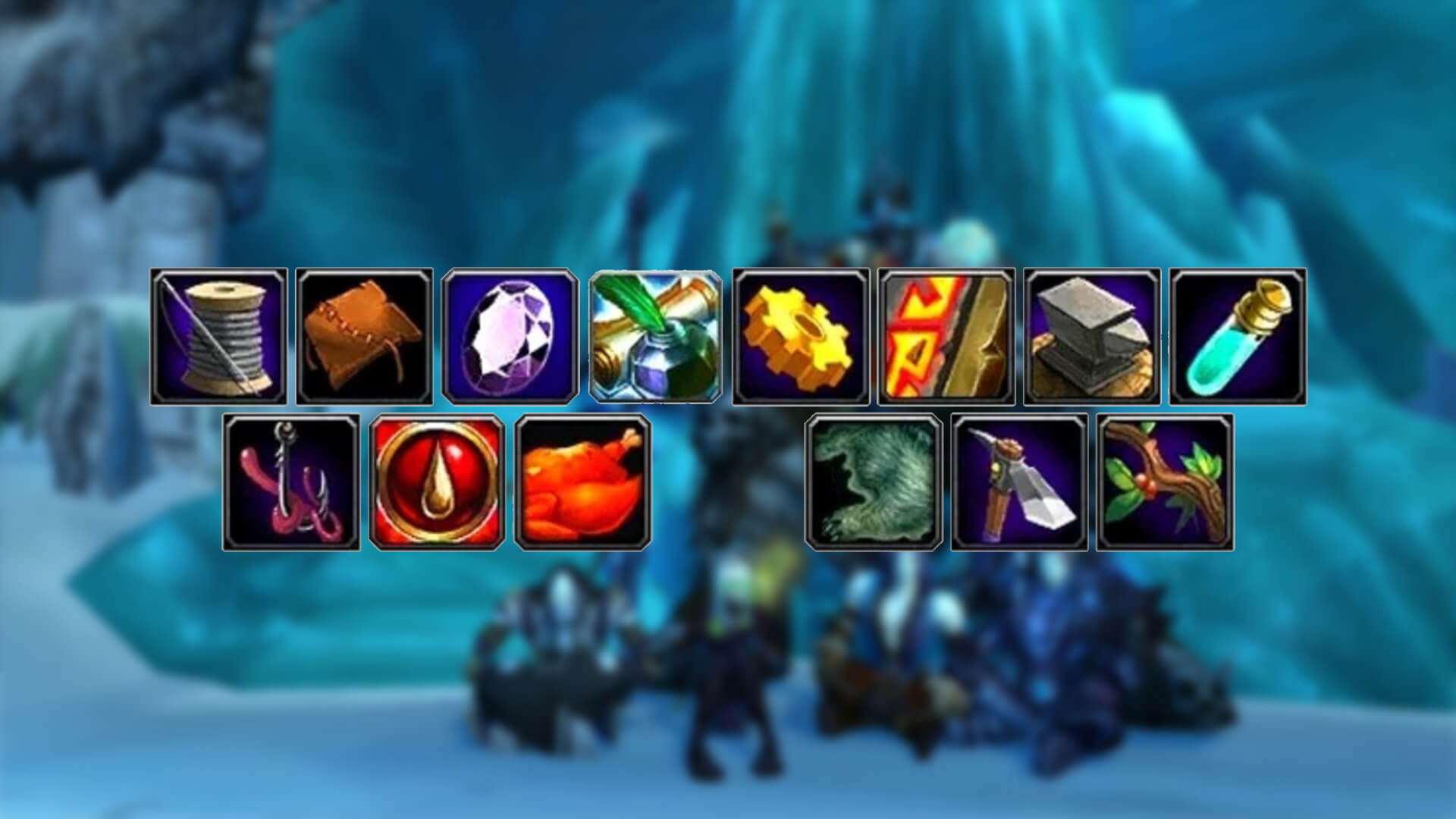
WotLK Professions Guide
Professions are a huge part of WoW, allowing players to earn or save money by collecting resources or creating products. Compared to other Classic versions of the MMORPG, WotLK Classic elevates them even more. A new craft has been added to the mix. Skill caps have risen to 450, with a corresponding increase in options. There are now exclusive advantages connected to most professions. Read this guide to learn the essentials about the WotLK Classic versions of all professions!
PRIMARY PROFESSIONS
The bulk of WoW professions fall into this category. They are divided into crafting and gathering subtypes. WotLK adds Inscription to the list of the former. It also introduces many more high-end recipes for crafters and several endgame materials for gatherers. Special bonuses for heroes with ranks in professions have been implemented, making this system more relevant in combat.
They take the form of either passive bonuses or unique items that only members of those professions can create and use or equip. As before, each hero can only have two leveled professions from this category at any given moment, making it important to choose carefully.
Alchemy
Alchemists have always been in a lucrative line of work, with products including health, mana, buff-adding, and debuff-removing potions, flasks, and elixirs. Such items can be very useful in any kind of content, ensuring that they are always in demand. Naturally, heroes could hang on to them for their own use, with spellcasters profiting the most from ready and inexpensive access to potions.
They can also use transmutation to create valuable high-end materials for other crafters. In WotLK, their repertoire expands to include many powerful new recipes, including combat characteristics-raising flasks. Additionally, they receive several exclusive benefits:
- a passive bonus to the duration and effectiveness of any alchemical consumables made by the character themselves;
- bound-on-pickup trinkets that raise different combat stats, including one that makes alchemical consumables more effective. Each also acts as a Philosopher’s Stone used in transmutation;
- a special refillable flask that can be set to increase the Strength characteristic or damage from spells or attacks. This unique “consumable” never runs out, allowing alchemists to rely on it indefinitely after brewing it (although the bonuses offered by high-end flasks are often superior, making this flask more useful for lower-level content).
Blacksmithing
In WotLK, blacksmiths no longer make mail armor pieces, limiting themselves to plate armor and weapons instead. As before, they also have to cope with pricey materials and slow leveling, making it a less than ideal option from a profit standpoint. This skill is still invaluable for heavy melee adventurers, though. In addition to crafting metallic equipment, blacksmiths can upgrade it in a number of ways.
The exclusive benefit for this craft is being able to attach an extra gem socket to their gloves and bracers (one each). Those sockets require a high level of Blacksmithing and disappear if the profession is abandoned. They grant players considerable versatility in designing their builds.
Enchanting
Enchanting is an efficient and lucrative profession. Instead of relying on gathering skills, its practitioners gain their raw materials by disenchanting other magic items, which can be acquired while adventuring or bought cheap at the Auction House. Those materials are then employed to upgrade items. WotLK adds the ability to place their enchantments in vellums, which can then be sold on the Auction House.
That is a much simpler business model than the previous method of meeting up to enchant items belonging to other players. Naturally, there are many strong endgame enchantments to apply too. Alone among adventurers, enchanters can create and wear special enchanted rings with hefty stat bonuses.
Engineering
Engineering continues to be the most popular profession of them all, due to the sheer variety of equipment, upgrades, and gizmos it produces. Their creations range from the weird and fun to the highly practical and powerful. The engineers’ arsenal grows substantially in this expansion. Some of the most notable additions include:
- Highly efficient healing and mana potion injectors;
- A mind control dish that could be attached to the engineer’s headwear;
- Rocket boots that accelerate movement for a short span of time while also making critical hits likelier;
- Gloves that provide a major temporary speed boost;
- Glove-mounted incendiary rockets that can fly to a great distance;
- An EMP device for scrambling mechanical opponents;
- A couple of cloaks that let wearers land safely when falling and then activate spell damage or Agility buffs;
- A mailbox that could be deployed in the field for several minutes;
- A mechanical servant that can be relied upon for banking or repairs on the go;
- Faction-specific motorbike-style “mounts” with sidecars for transporting other heroes.
Many of those special attachments can only be used by engineers or (in case of injectors) give them bigger bonuses. That leaves high-level engineers at a distinct advantage over their enemies. All kinds of classes can benefit from those enhanced combat options, though it may be especially true for focused damage-dealers and frontline fighters. The main disadvantage to Engineering is that materials for leveling it up are hard to come by, especially since they are so in-demand. The newly-added ability to scavenge resources from defeated mechanicals does help in this regard.
Inscription
This newly-implemented craft enhances characters in a number of ways:
- Glyphs that alter heroes’ abilities in ways that can be purely cosmetic or mechanically consequential;
- Special enchantments for equipment; Vellums that can store gear enchantments made using this profession or Enchanting;
- Off-hand tomes offering major bonuses and sometimes special effects;
- Darkmoon Cards that can be converted into powerful trinkets.
All of those items can be sold at a profit. They are sufficiently varied to be always in demand and to be handy for any class, although spellcasters are especially likely to benefit. Scribes also enjoy access to exclusive shoulder enchantments. While their advantage can be matched by attaining the highest Sons of Hodir reputation, that would require a lengthy grind. Many players would no doubt prefer the convenience of getting them early, which would also provide an important edge early into the expansion.
Jewelcrafting
Jewelcrafting is another popular craft. It creates gems that can be inserted into sockets on equipment, conferring bonuses. The bonuses are varied and useful for any class, though melee fighters can get the most out of stamina buffs. Some of the newest gems are very powerful indeed, making them indispensable for high-level gearing. As a result, the profession is potentially lucrative, though it would take a while to master. Jewelers can also acquire Dragon’s Eye gems by completing certain daily quests. Those premium jewels can only be equipped by jewelers and grant them bonuses beyond the reach of other heroes. Only three can be equipped at any moment, but that still offers a great deal of flexibility and power.
Leatherworking
Leather and mail armor pieces both fall into the purview of leatherworkers in this expansion, making this craft appealing for several classes. The same crafters can make armor kits (upgrades), professional and ammo bags, and drums for party-wide buffs. New options for items of all types appear in this expansion, including some truly potent drums that are invaluable for raiding and fetch a good price on the market. The leatherworkers’ exclusive fur lining upgrades can replace other enchantments for leg and bracer slot pieces, providing superior resistance or offensive bonuses than the alternatives.
Tailoring
Tailors chiefly make cloth “armor” for most spellcasting classes out of cloth items found while adventuring. Just like Enchanting, it does not rely on the products of another profession, giving players some flexibility. The clothing and upgrades that Tailoring produces are practically indispensable for spellcasters, especially the tailor-only embroidering enchantments that can deliver major magical combat bonuses. Tailors can also weave magic carpets, which serve as exclusive flying mounts. Last but not least, they make a variety of bags, with fresh recipes for bigger versions that are guaranteed to sell well at the Auction House.
Herbalism
Herbalists deliver the raw materials for Alchemy and Inscription, making this profession more rewarding than ever in the financial sense. It does require players to travel out of their way to harvest herbs, but at least their nodes recover relatively quickly and many of the ones in Northrend do not require major detours from the quest routes. Their passive bonus is a gradual self-healing ability that is upgraded at higher degrees of mastery. It is especially useful for classes that are underserved in terms of their own healing abilities, and it goes well with wandering in the wilderness.
Mining
Blacksmiths, engineers, and jewelers alike need the ores produced by miners. Mining is therefore best taken alongside those highly popular professions. However, miners can also make a fortune by selling materials on the Auction House. Although their nodes are out of the way compared to ones sought by herbalists, the profits can make those detours worthwhile. The expansion makes it slightly more convenient by letting miners collect all resources from a node in one click. It also adds a passive Stamina bonus that is sure to be appreciated by tanking heroes. This bonus increases at certain thresholds of skill mastery.
Skinning
Skinners gather resources by harvesting them from the carcasses of certain foes. That makes Skinning a very simple and efficient profession that does not require any complex planning to use normally. The one complication is that it is very popular, forcing focused resource farmers to compete over the same beasts in a few especially fruitful locations. The hides are then repurposed by leatherworkers, suggesting an obvious combo. Their passive bonus progressively increases the critical strike rating as they improve this skill, cementing this craft’s popularity among moderately-armored and damage-oriented heroes.
SECONDARY PROFESSIONS
Unlike their primary counterparts, secondary professions have no restrictions. Players can master all three of them without needing to fulfill any prerequisites. There are good reasons to do just that. While they lack the special bonuses and wide-reaching utility of primary professions, all secondaries offer some benefits to those willing to put in the effort training them. They save adventurers money, help them in battle (directly or otherwise), and are required for certain minor but useful quests.
First Aid
First Aid is the most straightforward profession available. It simply creates healing bandages out of cloth. It is nevertheless invaluable, as extra healing items can mean the difference between life and death in many situations. Notably, bandages can be deployed in virtually every type of content and can be created even in the midst of combat. They are especially useful for classes with limited healing options of their own. There are two more particularly potent bandage types that become available in this expansion.
Cooking
Cooking is a far more varied source of consumables. Basic food items can recover an individual’s health or mana and temporarily buff certain stats. Feasts bring similar bonuses to entire parties. Both types of consumables are therefore useful for everyone and easy to sell, though feasts are particularly lucrative given their use in high-end raiding. There are quite a few Cooking quests in the new hub, which allow players to unlock additional recipes and even earn a special hat that accelerates meal preparation. Ingredients for Cooking can be acquired through adventuring, though some come from Fishing.
Fishing
On that note, Fishing has become a surprisingly involved part of this MMORPG. There are several Fishing quests and events that award varied items to successful participants. Most of those prizes just make it easier to fish, but some help with other parts of the game too. In addition to raw materials for Cooking, fishers can sometimes obtain rarer items from their normal activities. That includes unique mounts, pets, and occasional equipment. Of course, for many players, the appeal of Fishing is taking a break from more hectic in-game activities and enjoying the scenery.
WHAT WE CAN DO TO HELP
As a result of the changes in this expansion, professions are more important than ever. The introduction of exclusive bonuses makes them crucial for elite performance, on top of their previous significance for saving or making in-game money. Fans of the profession-driven gameplay would also enjoy the variety of materials and recipes found in Northrend. However, leveling up skills to master those additions can be a daunting process. BuyBoost’s WotLK Boost services can help players achieve rapid professional success. Our boosters would level up professions using the most efficient routes or crafting sequences.
POPULAR NEWS

Diablo IV is a famous fantasy game with various RPG elements.

In these guides you will learn more about the barbarian build

Tier Lists of Best and Worst Classes and Specializations to Play in Mythic+ Dungeons and Raids in 10.1

We can help you reach the WotLK max level quickly
